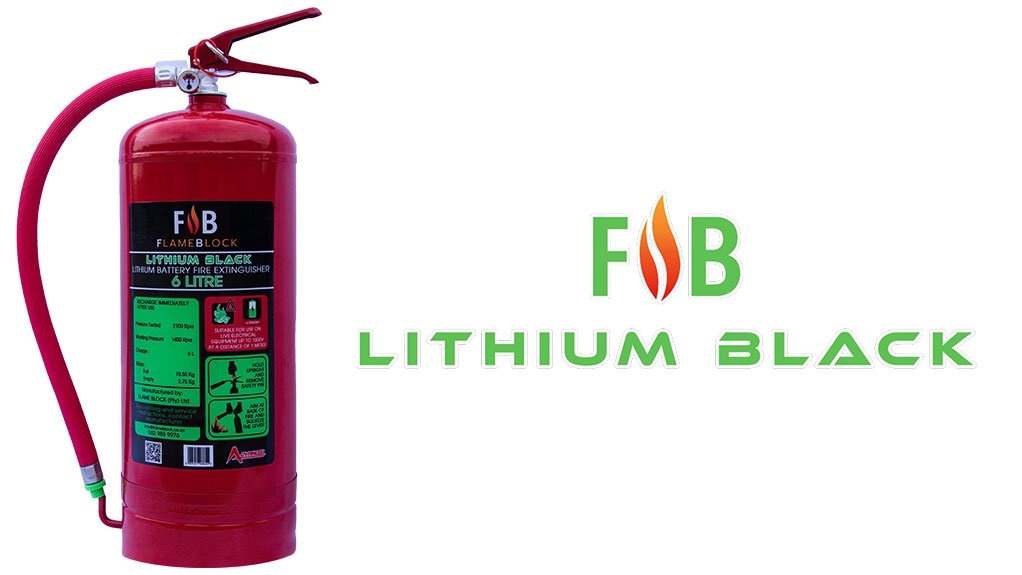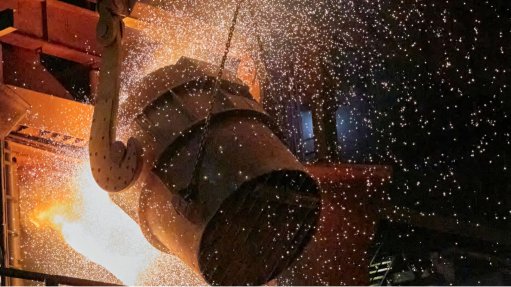FlameBlock develops pioneer solution to extinguish lithium-ion battery fires
Passive firefighting specialist FlameBlock has developed the FlameBlock Lithium Black (FLB), a uniquely formulated fire extinguishing agent designed specifically to extinguish lithium-ion battery fires.
Speaking to Engineering News this month, FlameBlock director Ferdi van Zyl, who co-developed the product, explained that this is a pioneer solution for South Africa, with the company pursuing it in response to the absence of a local extinguishing agent for lithium-ion battery fires.
Van Zyl warned of the dangers of these fires, which he said are becoming increasingly prevalent in the country, with Johannesburg alone reporting about six each month.
He explained that such fires are difficult to contain, spread rapidly, and can cause explosions and emit dangerous gases.
Van Zyl pointed out that lithium-ion batteries are relatively safe, but that the issue lies, rather, with associated equipment – for example, faulty cables and incorrect installations, which cause the battery to overheat or malfunction, leading to fires.
He explained that such fires cannot be properly extinguished using generic DCP or wet chemical fire extinguishers.
In instances where batteries are housed inside sealed metal boxes, and a fire erupts, it is difficult to open this and extinguish the fire, and using a fire extinguisher on the outer casing will not be effective, he warned.
Therefore, the only option to cool down the impacted equipment, Van Zyl explained, is to encase it – an essential characteristic of the FLB. The batteries can then be removed and, ideally, disposed of safely with the fire brigade.
Moreover, encapsulating the impacted equipment with an impermeable coating prevents toxic gases from the fire from being released, Van Zyl highlighted.
IDEAL SOLUTION
The FLB product is a black viscous liquid, with a gel-like structure when undisturbed.
It flows readily when a force is applied on it.
The gel formulation facilitates rapid cooling, and forms an impermeable coating, thereby disrupting combustion at a molecular level.
It works by creating a layer over the lithium battery fire, within seconds, keeping the final temperature considerably below 100 °C, and starving the fire of air, especially the hot spots.
It also forms a relatively strong coating that opposes the bubbling and breaking of the polymer-laminated film – this bubbling process normally allows for the movement of air, thereby continuing the fire triangle.
FLB provides a cost-effective method to extinguish lithium fires at any scale, including large-scale battery units.
Notably, the product is environmentally safe and degradable, Van Zyl acclaimed, with it able to be tolerated and absorbed in any exposed ecosystem without adversely affecting fauna and flora. This is owing to its main ingredients being bio-based, which the company actively sought.
After application, the concentration of the product can be thinned and washed away with water, allowing for a safe and environment-friendly disposal.
It is also largely safe for humans and can be washed away with soap and water, should it come into contact with skin.
APPLICATIONS
The FLB product can be used in several different applications.
Firstly, it can be applied using a standard fire extinguisher that is conventionally associated with water-based synthetic foams.
After use, these can be refilled at several Advanced FST branches across the country.
The second application is a proactive, novel idea from FlameBlock.
It entails an in-box suppression system, whereby the FLB product is placed inside the casing of battery packs.
Therefore, as soon as a fire breaks out, the solution is released from its container and the batteries are covered immediately.
Van Zyl explained that the container is graded for a certain temperature, because batteries can run hot when operating. Moreover, it only melts and releases its contents at a certain temperature, and requires sustained heat exposure – thereby ensuring that the FLB is not released unnecessarily.
It also does not impact on the normal functioning of the batteries.
Van Zyl pointed out that while the first extinguisher application is a good option for responding to fires, this is only the case if someone is on site when the fire occurs – a reactive solution.
Therefore, the company sought to also pursue a proactive solution.
“An extinguisher only works if you’re there to operate it. We actually make products for when you’re not there,” he commented.
FlameBlock is liaising with certain battery manufacturers to implement the FLB product in their batteries from the outset.
Moreover, Van Zyl informed that the company continues to pursue innovation and improvement with FLB, and is investigating several other applications that it will bring to the market when ready.
APPROVAL PROCESS
One constraint that the company is facing is the lack of a South African Bureau of Standards (SABS) protocol for lithium fires.
He noted, however, that FlameBlock is engaging with SABS to try to expedite the progress.
However, in the interim, the company is in the process of acquiring British Standards Institution certification for FLB, since this will be accepted by the local market.
Van Zyl emphasised that the companies in South African claiming that they have SABS-approved lithium fire extinguishers and extinguishing agents are misleading customers.
FLB was developed over a period of two years by Van Zyl, along with FlameBlock’s chemist, Dr Deon de Wet-Roos.
Moreover, owing to a lack of established European, British and American standards during the development period, the company undertook comprehensive in-house testing to ensure the viability of the product.
The product is currently available to the market, and Van Zyl highlighted that it has already successfully been used by a client to combat a lithium-ion battery fire.
While the company fleshes out the certification issue, it is holding monthly demonstrations to any interested clients, to showcase that it has a solution for lithium-ion fires.
Article Enquiry
Email Article
Save Article
Feedback
To advertise email advertising@creamermedia.co.za or click here
Press Office
Announcements
What's On
Subscribe to improve your user experience...
Option 1 (equivalent of R125 a month):
Receive a weekly copy of Creamer Media's Engineering News & Mining Weekly magazine
(print copy for those in South Africa and e-magazine for those outside of South Africa)
Receive daily email newsletters
Access to full search results
Access archive of magazine back copies
Access to Projects in Progress
Access to ONE Research Report of your choice in PDF format
Option 2 (equivalent of R375 a month):
All benefits from Option 1
PLUS
Access to Creamer Media's Research Channel Africa for ALL Research Reports, in PDF format, on various industrial and mining sectors
including Electricity; Water; Energy Transition; Hydrogen; Roads, Rail and Ports; Coal; Gold; Platinum; Battery Metals; etc.
Already a subscriber?
Forgotten your password?
Receive weekly copy of Creamer Media's Engineering News & Mining Weekly magazine (print copy for those in South Africa and e-magazine for those outside of South Africa)
➕
Recieve daily email newsletters
➕
Access to full search results
➕
Access archive of magazine back copies
➕
Access to Projects in Progress
➕
Access to ONE Research Report of your choice in PDF format
RESEARCH CHANNEL AFRICA
R4500 (equivalent of R375 a month)
SUBSCRIBEAll benefits from Option 1
➕
Access to Creamer Media's Research Channel Africa for ALL Research Reports on various industrial and mining sectors, in PDF format, including on:
Electricity
➕
Water
➕
Energy Transition
➕
Hydrogen
➕
Roads, Rail and Ports
➕
Coal
➕
Gold
➕
Platinum
➕
Battery Metals
➕
etc.
Receive all benefits from Option 1 or Option 2 delivered to numerous people at your company
➕
Multiple User names and Passwords for simultaneous log-ins
➕
Intranet integration access to all in your organisation




















